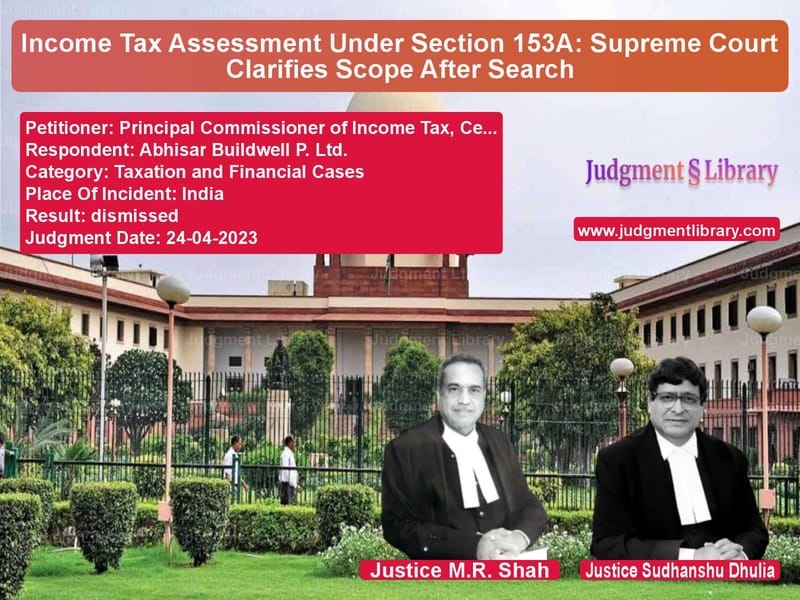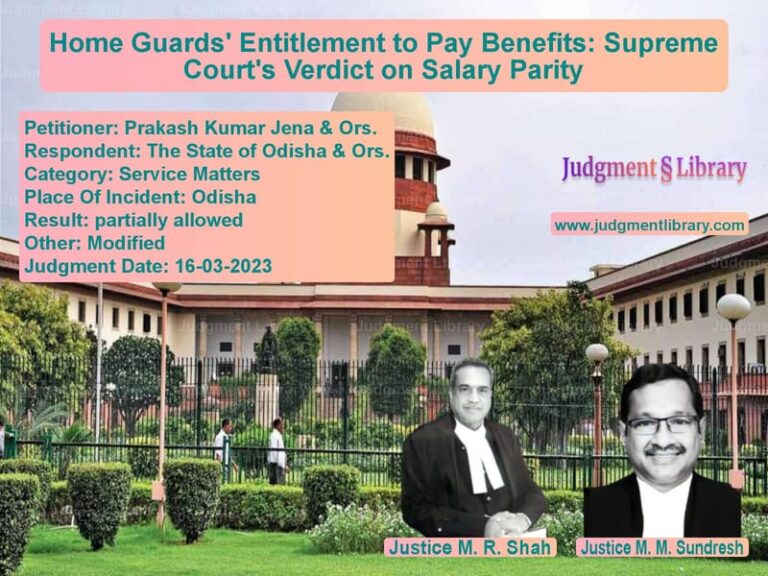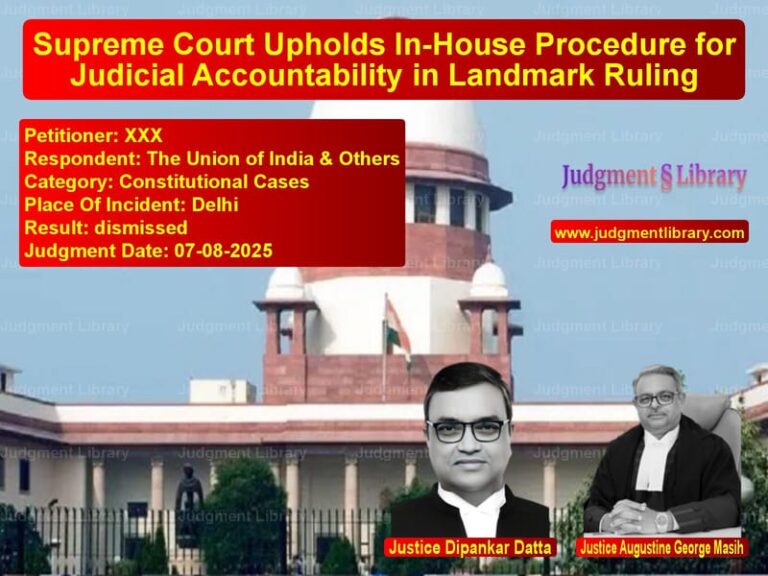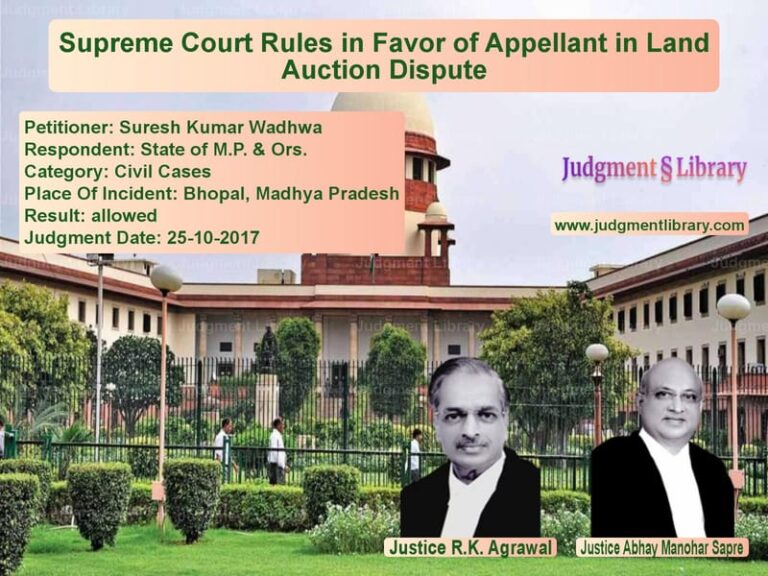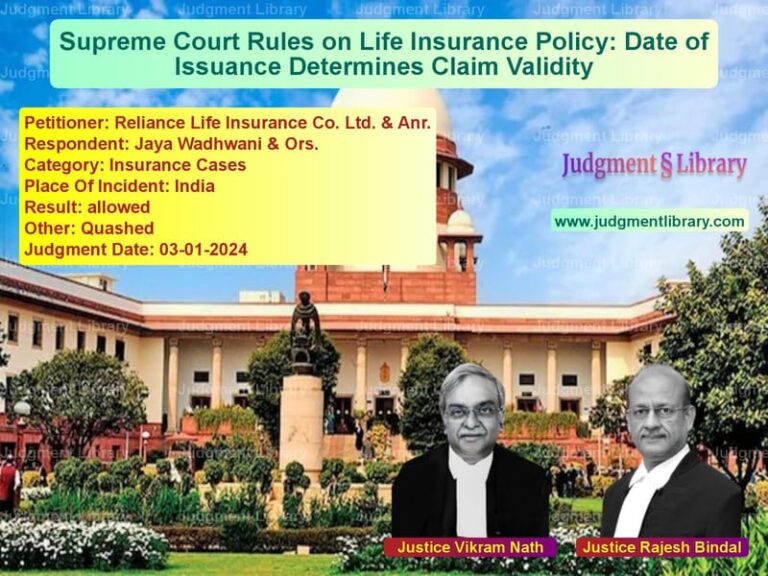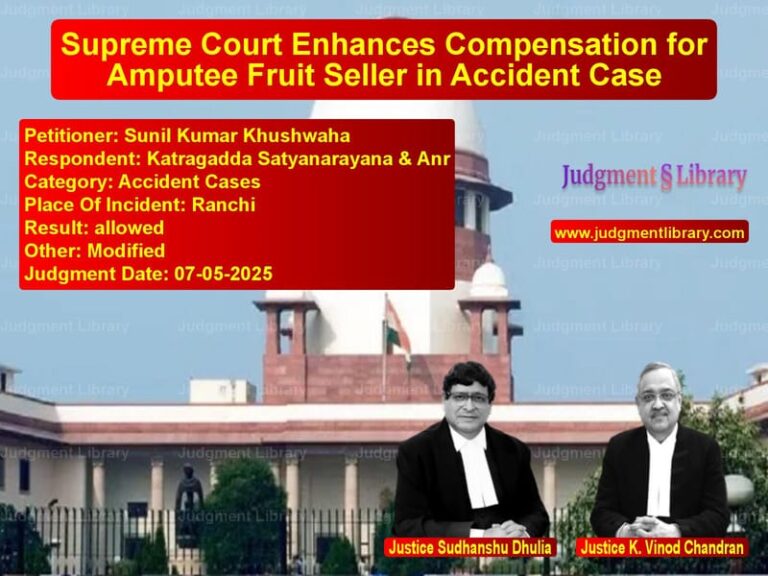Income Tax Assessment Under Section 153A: Supreme Court Clarifies Scope After Search
The Supreme Court of India recently addressed a crucial issue concerning the scope of income tax assessments under Section 153A of the Income Tax Act, 1961. The case involved the Principal Commissioner of Income Tax, Central-3, and Abhisar Buildwell P. Ltd., along with other connected appeals. The central question was whether the Assessing Officer (AO) could reassess total income under Section 153A, even in cases where no incriminating material was found during a search under Section 132.
The ruling has significant implications for tax assessments following searches, particularly for taxpayers whose assessments were already completed. The judgment clarifies that in cases where no incriminating material is discovered, the AO does not have the authority to reassess income under Section 153A and must follow the separate procedures under Sections 147 and 148 for reopening assessments.
Background of the Case
The appeals arose from a dispute regarding the proper interpretation of Section 153A, which governs assessments following a search or requisition. The Revenue’s position was that once a search is conducted under Section 132, the AO has the authority to reassess total income for the previous six assessment years, even in the absence of incriminating material. The assessees contended that such an interpretation would amount to reopening completed assessments without any valid justification.
The dispute stemmed from conflicting High Court rulings. While some High Courts held that Section 153A allows for reassessment only if incriminating material is found during the search, others ruled that the AO has the power to reassess total income regardless of whether such material is found.
Arguments by the Revenue
The Additional Solicitor General (ASG), Shri N. Venkataraman, appearing for the Revenue, presented the following arguments:
- Section 153A provides for reassessment of total income, not just undisclosed income. Since income tax is a tax on total income, any interpretation that limits reassessment only to incriminating material is contrary to the scheme of taxation.
- The previous block assessment system under Section 158BA, which only assessed undisclosed income, was replaced with Section 153A to allow for a more comprehensive assessment process.
- Allowing reassessment of total income ensures that any escaped income can be brought to tax, thereby preventing tax evasion.
- Even if no incriminating material is found, the AO retains the power to reassess total income under Section 153A, as the provision mandates a fresh assessment following a search.
Arguments by the Assessees
The assessees, represented by senior advocates including Shri Arvind P. Datar and Shri Kavin Gulati, argued:
- Section 153A is not a general reassessment provision but a special provision triggered by a search under Section 132. If no incriminating material is found, the AO cannot disturb completed assessments.
- High Courts, including the Delhi High Court in Kabul Chawla and the Gujarat High Court in Saumya Construction, have consistently held that completed assessments cannot be reopened under Section 153A unless incriminating material is found.
- If the Revenue’s argument were accepted, a search could become a tool to extend the time limit for reopening assessments indefinitely, undermining the statutory safeguards under Sections 147 and 148.
- The purpose of Section 153A is to assess only the undisclosed income found during a search. Permitting the AO to reassess total income without any new evidence would amount to a fishing inquiry.
Supreme Court’s Ruling
The Supreme Court ruled in favor of the assessees, holding that:
- In cases where an assessment has already been completed before a search, the AO can reassess income under Section 153A only if incriminating material is found during the search.
- If no incriminating material is found, any additions to income must be made under Sections 147 and 148, which have their own safeguards and limitations.
- The AO does not have blanket power to reassess total income merely because a search has taken place.
- The Revenue’s argument that Section 153A allows for reassessment of total income without requiring incriminating material was rejected.
Implications of the Judgment
The ruling has far-reaching implications for taxpayers and the Income Tax Department:
- Taxpayer Protection: The judgment protects taxpayers from arbitrary reassessments in cases where no incriminating material is found during a search.
- Clarification on Section 153A: The Supreme Court has provided much-needed clarity on the scope of Section 153A, ensuring that it is not misused by the tax authorities.
- Compliance with Due Process: The decision reinforces the principle that reassessments must follow due process, and if the Revenue seeks to tax additional income not uncovered in the search, it must invoke Sections 147 and 148.
Conclusion
The Supreme Court’s ruling settles the long-standing dispute regarding the scope of Section 153A assessments. It upholds the principle that completed assessments cannot be reopened arbitrarily and that the AO’s power under Section 153A is limited to assessing undisclosed income found during a search. This judgment ensures a fair balance between tax enforcement and taxpayer rights, preventing undue harassment while allowing the Revenue to assess income based on concrete evidence.
Petitioner Name: Principal Commissioner of Income Tax, Central-3.Respondent Name: Abhisar Buildwell P. Ltd..Judgment By: Justice M.R. Shah, Justice Sudhanshu Dhulia.Place Of Incident: India.Judgment Date: 24-04-2023.
Don’t miss out on the full details! Download the complete judgment in PDF format below and gain valuable insights instantly!
Download Judgment: principal-commission-vs-abhisar-buildwell-p.-supreme-court-of-india-judgment-dated-24-04-2023.pdf
Directly Download Judgment: Directly download this Judgment
See all petitions in Income Tax Disputes
See all petitions in Tax Evasion Cases
See all petitions in Tax Refund Disputes
See all petitions in Judgment by Mukeshkumar Rasikbhai Shah
See all petitions in Judgment by Sudhanshu Dhulia
See all petitions in dismissed
See all petitions in supreme court of India judgments April 2023
See all petitions in 2023 judgments
See all posts in Taxation and Financial Cases Category
See all allowed petitions in Taxation and Financial Cases Category
See all Dismissed petitions in Taxation and Financial Cases Category
See all partially allowed petitions in Taxation and Financial Cases Category

